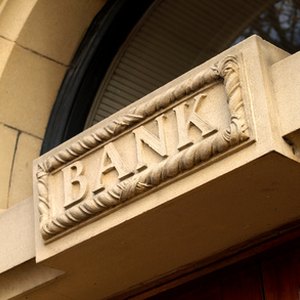
Your credit report has valuable and hopefully correct information about how well you pay your bills. However, according to CNBC, none of the three national credit reporting companies include your bank account in your credit reports. Your banking history isn’t a factor in your credit score either.
Your Credit History
Before you get your first car loan or department store card, you’ll need a credit history. However, the bills that the credit reporting agencies report aren’t just loans and cards. Your credit history also has a record of payments you made for rent, utilities and other financial obligations.
In the case of loans and credit cards, the report has a full payment history from the date the lender opened your account to the present or the date the account closed. This record lists the amount of your total debt or the credit line for every lender. In this record, your creditors, landlords or mortgage holders also report whether you paid the scheduled amount on time or later than agreed. Each reporting agency also calculates the ratio of total credit available to you compared to your total debt.
Additional Credit Report Items
Credit rating requests from potential lenders also show up in your credit report. Credit reporting companies also keep a record of your current and earlier employment, your addresses, along with personal identifying information. Your date of birth, Social Security number and even arrests, if applicable, will always be in your credit report, says USAGov.
Banking Information Sources
Because your credit report doesn’t contain information on your bank accounts, lenders need you to voluntarily provide it to them if their regulations require them to use the information to make a decision about offering you credit. The American Bankers Association says that several federal laws keep your bank from sharing the balances, age and type of assets in your bank accounts.
Specific circumstances and exceptions include subpoenas in legal actions, bankruptcy courts, IRS and other federal agencies. Your bank must notify you of any exceptions when they occur before it discloses the information requested.
ChexSystems Reporting System
The Consumer Finance Protection Bureau notes that when you want to open certain types of bank accounts, your bank reviews your previous banking history through ChexSystems, a national banking reporting agency. Unlike lenders, banks, credit unions and similar financial services don’t need you to voluntarily provide your banking history.
Your ChexSystems record has information about all your checking account banking relationships. The reports include any current and earlier overdrafts, account closures, debit card abuse and possible fraud or identity theft. Like credit reporting companies, ChexSystems assigns a score to your banking history. Negative information decreases your score.
Reviewing ChexSystems Reports
A low score will prevent you from opening new bank accounts. Experian suggests that you review your report at least annually. Federal law requires that ChexSystems give you one free report annually. You can also request a free report if a bank refuses to let you open a checking account based on information from ChexSystems.
Request your report and your score on the ChexSystems website. The company also lets you request reports by phone or mail. To dispute errors, you’ll need to send written documentation to ChexSystems. If a current or earlier checking account has a negative balance, you’ll have to settle that account. After that, you can ask the bank to remove the negative information from your ChexSystems report and revise your score.
References
- CNBC: Do Checking and Savings Accounts Impact Your Credit Score?
- USAGov: Credit Reports and Scores
- American Bankers Association: Existing Privacy Laws Already Regulate Information Sharing
- Consumer Finance Protection Bureau: ChexSystems
- Experian: How to Clean Up a ChexSystems Report
- ChexSystems: FACTA Free Annual Report
- Experian. "How to Clean Up a ChexSystems Report." Accessed Aug. 7, 2020.
- Consumer Financial Protection Bureau. "ChexSystems." Accessed Aug. 7, 2020.
- ChexSystems, Inc. "Frequently Asked Questions (FAQ's)." Accessed Aug 7, 2020.
- Experian. "Why Was I Denied a Checking Account?" Accessed Aug. 7, 2020.
- Consumer Financial Protection Bureau. "Early Warning Services." Accessed Aug. 7, 2020.
- Experian. "What Is a Credit Report?" Accessed Aug. 7, 2020.
- ChexSystems, Inc. "Common Mistakes to Avoid." Accessed Aug. 7, 2020.
- ChexSystems, Inc. "ChexSystems Consumer Score." Accessed Aug. 7, 2020.
- New York State Office of the Attorney General. "A.G. Schneiderman Issues Letter Calling on Banks to Revise Their Applicant-Screening Methods and to Expand Access to Mainstream Banking for Unbanked and Underbanked Communities." Accessed Aug. 7, 2020.
- New York State Office of the Attorney General. "A.G. Schneiderman Announces Commitment by Citibank to Eliminate Barriers That Unfairly Keep Low-Income Americans From Opening Checking and Savings Accounts." Accessed Aug. 7, 2020.
- New York State Office of the Attorney General. "A.G. Schneiderman Announces Commitment By Santander Bank To Eliminate Barriers That Unfairly Exclude Low-Income Americans From Mainstream Financial Services." Accessed Aug. 7, 2020.
- Consumer Financial Protection Bureau. "Denied for a Bank Account? Here’s What You Should Know." Accessed Aug 7, 2020.
- Experian. "What Is Second Chance Banking?" Accessed Aug. 7, 2020.
- ChexSystems, Inc. "Consumer Disclosure." Accessed Aug 7, 2020.
- ChexSystems, Inc. "FACTA Free Annual Report." Accessed Aug 7, 2020.
- Experian. "Understanding the Fair Credit Reporting Act." Accessed Aug. 7, 2020.
- Federal Trade Commission. "Consumer Reports: What Information Furnishers Need to Know." Accessed Aug. 7, 2020.
Writer Bio
Carol Luther has published feature articles in print magazines, ghostwritten blogs, and produced digital content since 2007. She has published personal finance and small business articles for the Houston Chronicle, Mahalo, the Nest, USA Today, Wahm, and Zacks. Carol has designed, implemented and managed multi-year, multimillion-dollar domestic and international projects services for higher education, nonprofits, and small to medium businesses for more than 20 years.

